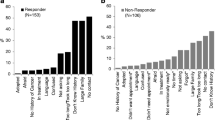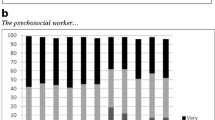Abstract
The motivation of people who seek advice about a family history of cancer was explored in a cross sectional study of new cancer referrals to five regional cancer genetics centres in England: the PACT (patient and clinical team) psychosocial study. One hundred sixty-two people took part. Measures were source of referral, estimated and perceived cancer risk, level of cancer worry, and personal and family-centred reasons for wanting to be seen in clinic. General practitioners referred more people than hospital doctors, and referred a larger proportion of people at low genetic risk of developing cancer. More than half of the participants had been the first to raise the issue of their family history of cancer. Personal motivation for referral is clearly different for those who have had a diagnosis of cancer and for those with children, compared to unaffected and childless people, and is characterised by altruistic concern for other family members rather than a perception of increased personal risk. Men and people from ethnic minorities are very significantly under-represented. Understanding people's motivation may be useful in targeting genetic counselling for people with a family history of cancer.
Similar content being viewed by others
References
Genetics and cancer services. Report of a Working Group for the Chief Medical Medical Officer, Department of Health. Working Group for the Chief Medical Officer, editor. London: Department of Health, 1998.
Wonderling D, Hopwood P, Cull A et al. A descriptive study of UK cancer genetics services: an emerging clinical response to the new genetics. Br J Cancer 2001; 85(2): 166-70.
Breast cancer gene queries surge. BBC News, 29 September 2001.
Richards MP. Genetic counselling for those with a family history of breast or ovarian cancer-current practice and ethical issues. Acta Oncol 1999; 38(5): 559-65.
Brain K, Gray J, Norman P et al. Why do women attend familial breast cancer clinics? J Med Genet 2000; 37(3): 197-202.
Collins V, Halliday J, Warren R, Williamson R. Assessment of education and counselling offered by a familial colorectal cancer clinic. Clin Genet 2000; 57(1): 48-55.
Hallowell N, Murton F, Statham H et al. Women's need for information before attending genetic counselling for familial breast or ovarian cancer: a questionnaire, interview, and observational study. BMJ 1997; 314(7076): 281-3.
Hopwood P. Psychological issues in cancer genetics: current research and future priorities. Patient Educ Couns 1997; 32(1-2): 19-31.
Julian-Reynier C, Eisinger F, Chabal F et al. Cancer genetics clinics: target population and consultees' expectations. Eur J Cancer 1996; 32A(3): 398-403.
Richards M, Hallowell N, Green J et al. Counseling families with hereditary breast and ovarian cancer: a psychosocial perspective. J Genet Couns 1995; 4: 219-33.
Hopwood P. Breast cancer risk perception: what do we know and understand? Breast Cancer Res 2000; 2(6): 387-91.
Shankar A, Chapman P, Goodship J. Genetic counselling: do we recognise and meet the consultands' agenda? J Med Genet 1999; 36(7): 580-2.
Nelson K, Garcia RE, Brown J et al. Do patient consent procedures affect participation rates in health services research? Med Care 2002; 40(4): 283-8.
Townsend P. Toward equality in health through social policy. Int J Health Serv 1981; 11(1): 63-75.
Townsend P, Phillimore P, Beattie A. Health and Deprivation: Inequality and the North. London: Routledge, 1988.
Majeed FA, Cook DG, Poloniecki J, Martin D. Using data from the 1991 census. BMJ 1995; 310(6993): 1511-4.
Lerman C, Seay J, Balshem A, Audrain J. Interest in genetic testing among first-degree relatives of breast cancer patients. Am J Med Genet 1995; 57(3): 385-92.
Lerman C, Trock B, Rimer BK et al. Psychological side effects of breast cancer screening. Health Psychol 1991; 10(4): 259-67.
Lerman C, Trock B, Rimer BK et al. Psychological and behavioral implications of abnormal mammograms. Ann Intern Med 1991; 114(8): 657-61.
Landis JR, Koch GG. The measurement of observer agreement for categorical data. Biometrics 1997; 33: 159-74.
Elwyn G, Gray J, Iredale R. Tensions in implementing the new genetics. General practitioners in south Wales are unconvinced of their role in genetics services. BMJ 2000; 321(7255): 240-1.
Winawer S, Fletcher R, Rex D et al. Colorectal cancer screening and surveillance: clinical guidelines and rationale-update based on new evidence. Gastroenterology 2003; 124(2): 544-60.
Naked bottoms in cancer campaign. BBC News, 4 April 2002.
Elwyn G, Iredale R, Gray J. Reactions of GPs to a triage-controlled referral system for cancer genetics. Fam Pract 2002; 19(1): 65-71.
Kumar S, Gantley M, Elwyn G, Iredale R. Integrating genetics into primary care in practice. BMJ 2001; 323(7325): 1367.
Lucassen A, Watson E, Harcourt J et al. Guidelines for referral to a regional genetics service: GPs respond by referring more appropriate cases. Fam Pract 2001; 18(2): 135-40.
Watson E, Austoker J, Lucassen A. A study of GP referrals to a family cancer clinic for breast/ovarian cancer. Fam Pract 2001; 18(2): 131-4.
Verbrugge LM. Gender and health: an update on hypotheses and evidence. J Health Soc Behav 1985; 26(3): 156-82.
Green J, Richards M, Murton F et al. Family communication and genetic counseling. The case of hereditary breast and ovarian cancer. J Genet Couns 1997; 6: 45-60.
Hallowell N. Doing the right thing: genetic risk and responsibility. Sociol Health Illness 1999; 21(5): 597-621.
Meiser B, Eisenbruch M, Barlow-Stewart K et al. Cultural aspects of cancer genetics: setting a research agenda. J Med Genet 2001; 38(7): 425-9.
Wang VO. Multicultural genetic counseling: then, now, and in the 21st century. Am J Med Genet 2001; 106(3): 208-15.
Weil J. Multicultural education and genetic counseling. Clin Genet 2001; 59(3): 143-9.
Cull A, Anderson ED, Campbell S et al. The impact of genetic counselling about breast cancer risk on women's risk perceptions and levels of distress. Br J Cancer 1999; 79(3-4): 501-8.
Evans DG, Burnell LD, Hopwood P, Howell A. Perception of risk in women with a family history of breast cancer. Br J Cancer 1993; 67(3): 612-4.
Weil J. Multicultural education and genetic counseling. Clin Genet 2001; 59(3): 143-9.
Author information
Authors and Affiliations
Rights and permissions
About this article
Cite this article
Fraser, L., Bramald, S., Chapman, C. et al. What motivates interest in attending a familial cancer genetics clinic?. Familial Cancer 2, 159–168 (2003). https://doi.org/10.1023/B:FAME.0000004621.38109.16
Issue Date:
DOI: https://doi.org/10.1023/B:FAME.0000004621.38109.16




